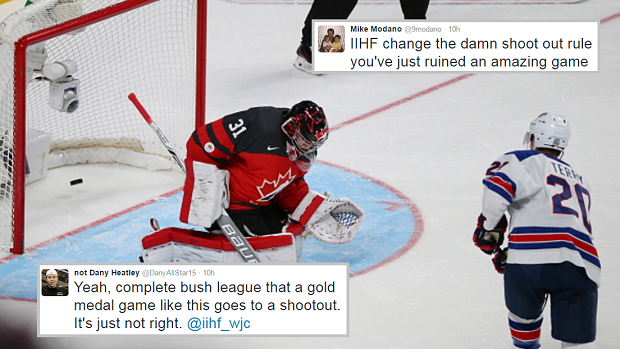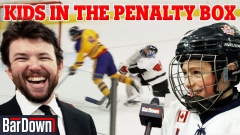There is a lot of anger and resentment circulating the web right now about how the World Junior Championship ended: In a shootout.
People from both sides of the border were upset with how the game was going to be decided, and made sure to get their opinions out before the breakaway challenge began, so as to remove any bias. From American legend Mike Modano to popular parody account, Dany Heatley All-Star, we heard opinions from all over.
So, should the shootout stay or should it go?
We hope the shootout never leaves. Here are 5 reasons why:
1. Legends are Born in all Formats
Yes, there have been many great overtime goals in World Junior hockey history, but it’s not the only memorable way to win at the World Juniors. There is only one other Gold Medal Game to be decided by a shootout (Russia vs. Czech Republic – 2000), but still, the shootout offered one of the most memorable moments of all time in 2007.
Jonathan Toews’ three shootout goals in the semi-final that year is one of the most talked about moments ever, and it wasn’t even in the tournament’s final. Troy Terry and T.J. Oshie (At the Olympics) will continue to be the most commonly talked about for Americans, but goalies can announce their presence to the world as well.
Last night, it was Tyler Parsons, who allowed no shootout goals on five Canadian attempts last night. In the past, it was Carey Price, who made the game-clinching save on the other end of Jonathan Toews' brilliance.
2. Overtime is Just as Flukey as a Shootout
Now listen here, we're no mathematicians, but this guy (Read PHD) is: Andrew C. Thomas, co-founder of WarOnIce and, now, analytics consultant to the Minnesota Wild.
He makes a couple great points on why the Shootout is a good thing, including this stat about it's randomness in comparison to Overtime.
This is especially true in the earlier knockout rounds where teams play four-on-four. We love four-on-four and three-on-three, but don’t act like they’re not a totally different style than typical five-on-five hockey.
3. Think of the Children
Now on to Thomas's other main point: Overtime can often be exciting, but not because the quality of hockey is improving. Players can become exhausted by this point in time, especially at the junior level, and the excitement comes from sloppiness and turnovers rather than a fantastic play.
We’re not saying it can’t be exciting, but it’s no secret that these players aren’t at their best in OT. For example, the tournament’s MVP and Canada’s player of the game Thomas Chabot had already played 44 minutes in that game, how much longer could he have gone?
Just look at the Bronze medal game, where the game was lost on an unfortunate mental lapse from 16-year-old Rasmus Dahlin.
4. “Some of us have to go to work in the morning”
There it is, the greatest response to aggression in rec league history. But seriously, we had to wake up really early today, and the shootout presented a way to get to bed earlier.
You may not want to admit it, but the Shootout is the bedtime hero we need, even if it's not the one we (some) wanted.
5. History
Since the tournament’s induction of playoff rounds and a Gold Medal Game in 1996, this is the way it has been. There was a slight alteration to the arrangement of extra time, but there has always been the possibility of a shootout.
This is the way the tournament has been forever and it’s nice to get variety sometimes. With only the second World Junior Gold Medal ever to be decided this way, it’s difficult to get to upset about it. The issue that many have with NHL shootouts is their frequency.
Everybody knew what the possibilities were; they both went through 20 minutes of overtime and it came down to shootout. It probably Stings for Canada's players at the moment, but so would any loss. If anything, give credit to their goalies that stood on their heads to leading up to and during the shootout.




